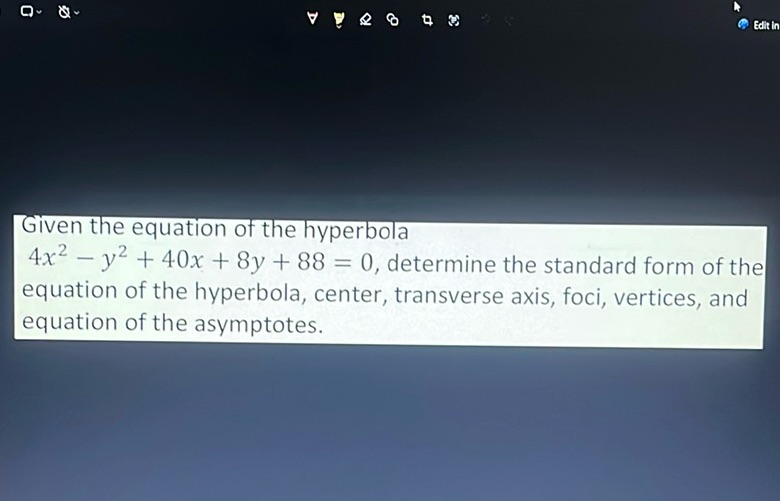Published
- 3 min read

Question: Given the equation of the hyperbola \[ 4x^2 - y^2 + 40x + 8y + 88 = 0, \] determine the standard…
Given the equation of the hyperbola \[ 4x^2 - y^2 + 40x + 8y + 88 = 0, \] determine the standard form of the equation of the hyperbola, center, transverse axis, foci, vertices, and equation of the asymptotes.
Solution
To determine the standard form of the hyperbola and its properties, we start with the given equation: \[ 4x^2 - y^2 + 40x + 8y + 88 = 0 \] First, rearrange terms to organize the equation: \[ 4x^2 + 40x - y^2 + 8y = -88 \] Complete the square for the \(x\) terms: 1. Factor out 4: \[ 4(x^2 + 10x) \] 2. Complete the square inside the parentheses: \[ x^2 + 10x \rightarrow (x + 5)^2 - 25 \] Thus, the expression becomes: \[ 4((x + 5)^2 - 25) = 4(x + 5)^2 - 100 \] Now, complete the square for the \(y\) terms: 1. \(y^2 - 8y \rightarrow (y - 4)^2 - 16\) Substitute these back into the equation: \[ 4(x + 5)^2 - 100 - ((y - 4)^2 - 16) = -88 \] Simplify: \[ 4(x + 5)^2 - 100 - (y - 4)^2 + 16 = -88 \] \[ 4(x + 5)^2 - (y - 4)^2 - 84 = -88 \] \[ 4(x + 5)^2 - (y - 4)^2 = -88 + 84 \] \[ 4(x + 5)^2 - (y - 4)^2 = -4 \] Divide the whole equation by -4 to achieve the standard form: \[ -(x + 5)^2 + \frac{(y - 4)^2}{4} = 1 \] Rewrite for clarity: \[ \frac{(y - 4)^2}{4} - (x + 5)^2 = 1 \] This is the standard form of the hyperbola. Now identify the properties: 1. Center: \((-5, 4)\) 2. Transverse axis: Vertical (since the \((y - k)^2\) term is positive) To find vertices: - \( a^2 = 4 \), so \( a = 2 \) Vertices are located 2 units above and below the center along the \(y\)-axis: 1. \((-5, 4 + 2) = (-5, 6)\) 2. \((-5, 4 - 2) = (-5, 2)\) To find the foci: - Calculate \( c \) using \( c^2 = a^2 + b^2 \) \[ b^2 = 1 \] \[ c^2 = 4 + 1 = 5 \] \[ c = \sqrt{5} \] Foci are located \(\sqrt{5}\) units above and below the center along the \(y\)-axis: 1. \((-5, 4 + \sqrt{5})\) 2. \((-5, 4 - \sqrt{5})\) Equation of the asymptotes: The asymptotes for a vertical hyperbola \(\frac{(y-k)^2}{a^2} - \frac{(x-h)^2}{b^2} = 1\) are: \[ y = k \pm \frac{a}{b}(x - h) \] Substitute values: 1. \( y = 4 \pm 2(x + 5) \) Equations are: 1. \( y = 2x + 14 \) 2. \( y = -2x - 6 \) These are the asymptotes.

